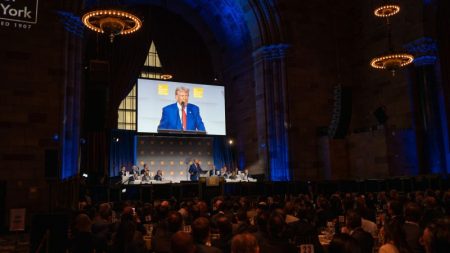A TV debate late in the campaign showcases the appeal of far-right leader Geert Wilders, who pulled off a shock victory in Dutch elections on Wednesday.
He was up against Frans Timmermans, the socialist standard bearer who returned from Brussels in a vain attempt to stop his homeland’s rightward tilt.
“You speak, I believe, seven languages,” Wilders told the son of a diplomat and ex-European commissioner. “But not the language of the people.”
The barb — similar to those thrown by Donald Trump in the US or by those in the UK who campaigned for Brexit — hit where intended with the electorate. Did they want Wilders, promising to “put the Dutch first”, or Timmermans, representing a globetrotting elite who could live anywhere, and easily afford increased food and housing costs?
Wilders, 60, who formed his Freedom party in 2006, has remained an outsider, doing little to curb his own crude attacks on Islam, migrants and Brussels during years in opposition.
He was convicted in 2016 for “collective discrimination” at a campaign rally where he led a chant calling for fewer Moroccans in the Netherlands. He lost an appeal and has never apologised.
In recent days he did moderate his tone and say he could compromise to form a government, with some Dutch media dubbing him “Geert Milders”.

And his win, with 23 per cent of the vote, shows the Dutch — and other Europeans — are listening after an immigration surge and economic difficulties blamed on an elite that has overseen a housing shortage, a reduction in public services and falling living standards amid high inflation.
“It’s the normalisation of the far right,” said Sarah de Lange, politics professor at the university of Amsterdam. By adopting a similar anti-immigrant stance, centre-right parties made Wilders acceptable. But that also meant that voters were emboldened to back him. “People want the original, not a copy,” said De Lange.
About 12 per cent of his voters were people who normally abstain and 15 per cent switched from the VVD, the centre-right but socially liberal party of outgoing prime minister Mark Rutte, she said.
Wilders’ surprise victory was in part due to a decision by the new VVD leader, Dilan Yeşilgöz-Zegerius, to leave the door open for a post-election alliance with him. That decision only emboldened voters to vote for the Freedom party, De Lange said. Yeşilgöz-Zegerius, herself an immigrant of Turkish origin, has adopted a stronger stance on migration than Rutte.
Wilders has also appealed to young voters, with a majority in the 18-35 age group voting for his party.
De Lange said Wilders, often lampooned abroad for his swept-back dyed platinum hair, should not be underestimated.
His party has been a fixture of the Dutch parliament since it was formed in 2006. It has maintained iron discipline, unlike many Dutch populist movements that have flared up and burnt themselves out.

“He’s the longest serving MP. He’s very smart in terms of tactics, debating style and rhetoric.” His MPs only speak with his permission and stick to the party line.
He also united the extreme right, she said, with rival parties shipping votes to him in the week before the vote as he rose in the polls.
Wilders, from Venlo in the southern Netherlands, grew up a Roman Catholic and joined the VVD, being elected to parliament in 1998. He mentored Rutte before becoming increasingly radical and leaving the party over its decision to support Turkey joining the EU.
His hostility to Islam was shaped by travels in the Middle East as a young man and time on a kibbutz in Israel.
He said Muslim societies there were intolerant and inconsistent with Dutch values. He advocates banning the Koran and the construction of mosques, along with immigration from Muslim countries.
His views attracted death threats and he and his wife live in a safe house with government-provided bodyguards.

In an interview in his windowless office in parliament in January — police fear a sniper attack — he told the FT that the Netherlands could not cope with so many incomers.
“Even people who don’t agree with us when it comes to immigration acknowledge the fact that it’s unacceptable that we as Dutch people have waiting lists from 10 to even 20 years to wait for [social] housing, that asylum seekers get priority. People are angry with many issues.”
He described Islam as a “totalitarian ideology”, saying people who converted to other faiths were sometimes killed, and claimed he did not hate Muslims.
“If I would have . . . criticised the negative aspects of Christianity and Judaism I would not have lost my personal freedom for more than 20 years.”
He is an admirer of Brexit and has a picture of Winston Churchill on the wall. He advocates a referendum on leaving the EU but said he favoured a Norway model, remaining in the single market.
“Democracy needs a nation state and national identity and national sovereignty,” he said, arguing too many laws were made in Brussels. “You should be in charge of your own front door, of your own borders.”
He previously held pro-Kremlin leanings, meeting officials on a trip to Moscow in 2018 at a time when relations with Russia were frozen after Dutch nationals died when their jet was shot down by Russian separatists in Ukraine. Since Russia’s full-scale invasion last year, Wilders has backed Kyiv though he questioned how much military support the Netherlands was providing.
If Wilders fails to form a government with him as prime minister, Timmermans would be second and Yeşilgöz-Zegerius third to try to cobble together a majority.
De Lange said Wilders might prefer to stay in parliament, controlling his group, and backing Yeşilgöz-Zegerius or a technocrat as prime minister.
“He’s an unattractive option. He’s persona non grata in many countries and there is the security question as well.”
Opposition parties believe a stint in power — with its inevitable compromises and betrayal of promises — could be the best way to neutralise him.
In 2010 Wilders agreed to back Rutte’s minority government, but he withdrew his backing two years later over budget cuts.
“Getting into government is like a new car. Once you get in you lose half the value,” quipped one official from a party in the outgoing coalition. “Wilders could govern — but not without disappointing his very faithful base.”
Read the full article here



